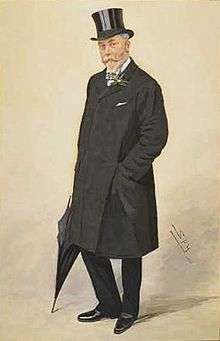James Lowther, 1st Viscount Ullswater
| The Right Honourable The Viscount Ullswater GCB PC JP DL | |
|---|---|
 | |
| Speaker of the House of Commons | |
|
In office 1905–1921 | |
| Monarch |
Edward VII George V |
| Preceded by | Sir William Gully |
| Succeeded by | J. H. Whitley |
| Personal details | |
| Born | 1 April 1855 |
| Died | 27 March 1949 (aged 93) |
| Nationality | British |
| Political party | Conservative |
| Spouse(s) | Mary Beresford-Hope (d. 1944) |
| Alma mater |
King's College London Trinity College, Cambridge |
James William Lowther, 1st Viscount Ullswater GCB PC JP DL (1 April 1855 – 27 March 1949) was a British Conservative politician. He served as Speaker of the House of Commons between 1905 and 1921.
Background and education
The son of Hon. William Lowther, a grandson of William Lowther, 1st Earl of Lonsdale and for 25 years Member of Parliament for Westmorland, and Alice, 3rd daughter of James Parke, 1st Baron Wensleydale, Lowther was educated at Eton College, King's College London where he took an Associateship degree, and at Trinity College, Cambridge, where he studied classics and law.[1] Lowther became a barrister in 1879, eventually becoming a Bencher of the Inner Temple in 1906.
Political career
He was Member of Parliament for Rutland in 1883; contested Mid Cumberland in 1885; and sat for Penrith from 1886–1921. He was appointed 4th Charity Commissioner in 1887, and held junior ministerial office as Parliamentary Under-Secretary of State for Foreign Affairs from 1891–1892. He was Chairman of Ways and Means and Deputy Speaker from 1895–1905 and Speaker of the House of Commons from 1905–1921.
There are three golden rules for Parliamentary speakers: Stand up. Speak up. Shut up.— J. W. Lowther, 1917
Other public appointments

Lowther represented Great Britain at the International Conference at Venice in 1892, and at the International Conference on Emigration at Rome in 1924. He was Chairman of the Speakers' Electoral Reform Conference in 1916–1917, of the Buckingham Palace Conference (on the partition of Ulster) in 1914, of the Boundary Commissions (Great Britain and Ireland) in 1917, of the Royal Commission on Proportional Representation in 1918, Devolution Conference in 1919, of the Royal Commission on London Government, 1921–1922; of Review Committee Political Honours, 1923–1924, and Statutory Commission on Cambridge University, 1923; of the Agricultural Wages Board from 1930–1940; of the Lords and Commons Committee on Electoral Reform, 1929–1930; and of BBC Enquiry Committee, 1935. He was a Trustee of the British Museum from 1922–1931 and a Trustee of the National Portrait Gallery from 1925. In 1907 his portrait was painted by Philip de Laszlo.
Honours
He was appointed to the Privy Council in 1898, created 1st Viscount Ullswater, of Campsea Ashe, in the County of Suffolk, on his retirement as Speaker in 1921,[2] and appointed a Knight Grand Cross of the Order of the Bath (GCB) in July 1921.[3] He also held the degrees of DCL from the University of Oxford, LL.D from the University of Cambridge and DCL from the University of Leeds.
Styles of address
- 1855–1883: Mr James William Lowther
- 1883–1885: Mr James William Lowther MP
- 1885–1886: Mr James William Lowther
- 1886–1898: Mr James William Lowther MP
- 1898–1921: The Rt Hon James William Lowther MP
- 1921–1949: The Rt Hon The Viscount Ullswater GCB PC
Family
On 1 March 1886, Lowther married Mary Frances Beresford-Hope (d. 16 May 1944). They had three children:[4]
- Major Christopher William Lowther (b. 18 Jan 1887, d. 7 Jan 1935). He was succeeded to the viscountcy by his great-grandson.
- Arthur James Beresford Lowther (b. 28 Oct 1888, d. 2 Mar 1967)
- Mildred Lowther (b. 1890,[5] d. 2 Jul 1973)
Footnotes
- ↑ "Lowther, James William (LWTR874JW)". A Cambridge Alumni Database. University of Cambridge.
- ↑ "No. 32413". The London Gazette. 5 August 1921. p. 6166.
- ↑ "No. 32394". The London Gazette. 19 July 1921. p. 5724.
- ↑ "thePeerage.com". Retrieved 2015-01-21.
- ↑ England & Wales, FreeBMD Birth Index, 1837–1915
External links
| Wikimedia Commons has media related to James Lowther, 1st Viscount Ullswater. |
- Hansard 1803–2005: contributions in Parliament by James Lowther
- Portraits of James William Lowther, 1st Viscount Ullswater at the National Portrait Gallery, London

- Campsea Ashe garden
- Electoral Reform Conference, 1917
- Proportional Representation Conference, 1918
- Devolution Conference, 1919
| Parliament of the United Kingdom | ||
|---|---|---|
| Preceded by Hon. Gerard Noel George Finch |
Member of Parliament for Rutland 1883–1885 With: George Finch |
Succeeded by George Finch |
| Preceded by Henry Howard |
Member of Parliament for Penrith 1886–1918 |
Constituency abolished |
| New constituency | Member of Parliament for Penrith and Cockermouth 1918–1921 |
Succeeded by Sir Cecil Lowther |
| Political offices | ||
| Preceded by Sir James Fergusson, Bt |
Under-Secretary of State for Foreign Affairs 1891–1892 |
Succeeded by Sir Edward Grey, Bt |
| Preceded by John William Mellor |
Chairman of Ways and Means 1895–1905 |
Succeeded by John Grant Lawson |
| Preceded by William Gully |
Speaker of the House of Commons 1905–1921 |
Succeeded by John Henry Whitley |
| Honorary titles | ||
| Preceded by The Marquess of Crewe |
Senior Privy Counsellor 1945–1949 |
Succeeded by Winston Churchill |
| Peerage of the United Kingdom | ||
| New creation | Viscount Ullswater 1921–1949 |
Succeeded by Nicholas Lowther |
.svg.png)